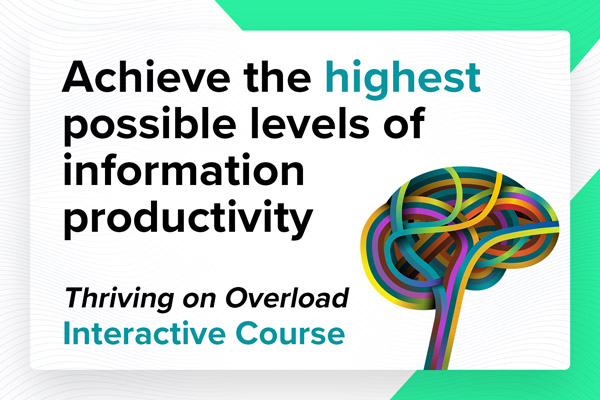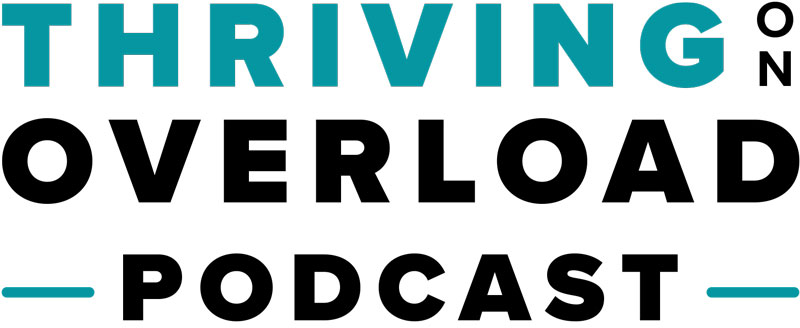Ross guested on Evan Kirstel‘s Techfluencer show recently.
Evan is a B2B thought leader, content creator, industry expert and top technology influencer. He creates content focused on educating his 550,000 strong audience how to grow a sustainable, long-term business.
In the interview, they talk about the origin story of the Thriving on Overload book, building a personal information plan for yourself, and focus to do your best work.
Transcript:
Evan Kirstel:
Hey everyone, another fantastic guest here. Today I have Ross: Dawson, one of my favorite folks on Twitter, futurist, author, entrepreneur, what did I miss Ross:, what else can I call you?
Ross Dawson:
That’ll do for now. It’s plenty on, so that’s a reasonable description.
Evan:
While you’re from the lovely city of Sydney, here and actually in New York for the week, and you have a new book Thriving on Overload: The Five Powers for Success. In a world of exponential information, I’ve started reading it, I’m really excited to finish it. But tell us where did the book idea come from? Tell us about the genesis of the book.
Ross:
Well, it’s actually 25 years ago. So I was first, starting out from corporate world doing my own thing and it just struck me, okay, we got lots of technology to help us with information. And we’ve got all sorts of culture to help organizations work. But the thing which organizations are not addressing is the capabilities of individuals, you know, to use our brains to take in information. And that was 25 years ago, we had too much information. We’ve got a little bit more now.
Ross:
And so it’s simply this idea that the fundamental thing which we need to succeed today, is the cognitive capabilities, the processes, the structures, the routines, the habits is whatever it is, which enables us to thrive, to find what is valuable in excess of information, to be able to see opportunities, make better decisions, work better. And this is the fundamental skill.
Ross:
So you haven’t, for example, and a number of other people, we know our information masters, but you’ve probably just worked out by yourself, you know, you didn’t do this at university. And I think a lot of the information masters I speak to, aren’t even fully conscious of how they do it.
Ross:
I think there’s just enormous value in instantly being conscious how is it that we can improve because it is just the fundamental capability for success. And so the book tries to unravel and lay out as much as possible the practices and the processes where people can prosper in a world where we have, hopefully do it permission, just enough if we think about the right way.
Evan:
That’s a great point. And I feel like I’m trying to survive in an era of information overload, thriving is a whole nother question. So you know, there’s a lot of talk about companies, you know, dealing with data and information and sorting and managing that and, but we don’t talk about individuals. So, you know, is this book meant to be a practical kind of framework or a road? blueprint or roadmap?
Ross:
Yeah, absolutely. And I set out to make it inspiring and to inspiring people see that there’s a positive side to this and pragmatic as useful as possible. So every chapter has exercises at the end of it.
Ross:
One of my most, one of my favorite comments in the interviews I’ve been doing recently was from the We Study Billionaires podcast where the host Trey Lockerbie said, I don’t think I’ve seen a book this packed with resources since The Four Hour Workweek. So that’s 15 years ago. And that’s the intent to pack it with resources to make it as pragmatic as possible.
Evan:
Well, no disrespect to the Four Hour Workweek but I haven’t seen many entrepreneurs working four hours a week, but I love the idea. So I’m hoping for some practical takeaways. What about those takeaways, tips, tricks, best practices? Can you give 1, 2, 3 examples of advice for us? Information junkies? You know, what have you seen out there in your research?
Ross:
Well, there’s a massive amount, depends on what level which we take it, and I think there’s a lot of tactics which we can take. And I think one of those is a little bit more than a tactic is being really clear about how we allocate our time and attention. And so much chatter on attention sort of looking at the different types of attention that we have, including from you know, what it is when we’re scanning for information, how it is, we’re assimilating information and taking it in how it is we’re giving time for ourselves.
Ross:
But for example, in scanning for news headlines, that’s something which we all tend to do a lot. Probably more than we did thus the word doom scrolling. Since most use is a fairly doom with probably a pretty good description of it. So the idea is to say, alright, let’s say I’ll spend 10 minutes or 15 minutes, whatever it is, doesn’t matter. Just choose a time to say this is the time to allocate to scanning the news and then I’m going to stop and if I really need to, I will put it in another time slot later. In the day, but in between, I will not look at the news headlines. And so that’s just one simple thing to do, but actually can make a massive amount of difference.
Ross:
Another one is simply every week, a minimum of two hours where you block everything out. And it doesn’t matter when it is during the week, it’s one time during week 10, I will turn off all notifications, all distractions, all incoming, I’ll tell everybody, I’m not doing that. And for two hours, you choose one thing to do, what you get to dive in. And you do that? Well, and part of that is getting better at being focused on one thing that is our brain needs to train ourselves to, to get used to that we need to exercise the muscle of attention. And that’s one of the pathways of doing it. So those are a couple of ways, quite specific things.
Ross:
But at the high level, it’s building a personal information plan, something where you work out what it is that works for you, and then stick to it then being conscious about it. So also, there’s a course, which was launched at the same time, an online course, which is an interactive course, it’s not just a series of content, it’s taking people through that process of designing their own personal information plan, and you don’t need the book, you don’t need the course though, I’m sure they’re extremely helpful.
Ross:
Because just this idea said, Okay, I’m gonna set a plan for myself to be more effective with my information. And just from this conversation, or maybe read the book of it here, if you want to, but just say, just having that intention. These are the things that I’ll do. These are the times and I’ll do it, this is why I’m doing it. This is these, I think anybody can just spend half an hour to set their own personal automation plan and decide what it is they will do differently and do better. Because so much of this is unplanned, unstructured just following our whims as opposed to putting the structure which can give us far more power in a world of unlimited information.
Evan:
Brilliant observations. What did you discover in researching the book on the effect of information overload on our mental health on our physical health well being? Is that something you can quantify?
Ross:
Not so much to quantify, but there is clear evidence. So I’ve done dug in quite extensively into the neuroscience behind the overload and one critical factor is that we do tend to get left brain, runs adrenaline pumping by our brain when we feel an excess overwhelmed when we’re not able to cope, which actually, not surprisingly, takes away from our ability to do it. So this is a negative spiral, when we start to feel overwhelmed, making us less able to deal with that, which makes us more overwhelmed.
Ross:
And so part of that, you know, the response to that is clearly where we need to, you know, there’s, I don’t actually talk about breathing techniques in the book. But that’s just one example of things that we can do to pull ourselves to a state where we are not feeling the overwhelm. And you can also chunk things down. Alright, we’ve got what seems like 100 things to do. Alright, let’s check that. Let’s just do 1, 2, 3. Okay, let’s forget everything else for now. So I’ve got something which my brain can process and I can get on with.
Ross:
One of the other really important things from neuroscience, which is known for some time, but it’s been very clearly demonstrated, more recent research is that there is no such thing as multitasking. Our brain is a serial processor, it is not a parallel processor. So when people think they are multitasking, the brain actually is switching from tasks with a very high cognitive overload. So it’s, we do need to learn that, in fact, trying to multitask will put more strain on us and again, in that negative cycle lead to us being less effective.
Evan:
Yeah, it’s really interesting, in particular, with learning and education with children who are bombarded by online content, screaming social media. You know, I look at my older teenage kids in their early 20s. And it’s just constant scrolling, right? It’s the Tick Tock Instagram kind of phenomenon. As a parent, what do you suggest there? Is it, you know, clamping down on usage, is it other tricks or other things to limit, you know, use of media, social media consumption by kids?
Ross:
It’s a really tough one. And as a parent myself, I also grapple with it. I don’t think there’s any easy solution. And I’m not a big believer personally and, you know, hard limits. So sometimes you do need them and particularly particular ages in turn, say Alright, well, you can add a little bit of time to do one of these things .
Ross:
There’s only so much you can do with young people and forming their own identities. But getting to understand quite how negative the impact is, and terms of their ability to be focused on the function. And to the degree, which you can do, introduce them just sort of like simple folks exercise even just for a few minutes at a time. And trying to get them to actually experience what it’s like to not be talking for a while, to try to introduce them to the focus apps which means that you can switch off for a period of time. And rather than imposing them, to let them discover that they can be useful, they actually feel more empowered, when they can switch them for a while. So it’s, it is highly challenging.
Ross:
Personally, I don’t believe in sort of being too directive or limiting, but trying to guide them in the direction where they can see the differences and the opportunities from spending time, which is more focused.
Evan:
Brilliant, great, great advice. You and I both spend a lot of time thinking about organizations, enterprises, and the similar effect in business in the enterprise, whether you call it Zoom fatigue, you know, Slack overload, email overload. I mean, we’re bombarded, you know, in our business lives with information with content, messaging, synchronous, asynchronous, any tips on, you know, managing this, that kind of overload from an organizational standpoint.
Ross:
So this is a critical point is understanding this idea of allocation of attention for individuals in an organization. And I think one approach perhaps goes, one company has done this. But it’s basically empowering teams to choose times when they will not be contacted, for example. So rather than just saying, okay, team are working on stuff, we’re always on Slack or whatever communication channel, we’re always engaged, to carve out a particular time every day, or one, for one morning a week, we will be able to not be in the closet to and fro, and to carve out time for specific activities. And hopefully to encourage, okay, well, there’s my project, this is one, we’re not going to get interrupted, to give an allow, and encourage every individual to communicate to all the team to say, Do not contact me Do not expect me to respond in particular time periods, and they can choose those time periods.
Ross:
So this becomes a norm, that you are not just a subject of everything that’s barraged at you, but everyone is given the power to say, Okay, I’m saying you can contact me, but there are times when I will not be contacted because I’m going to get into a state I’ll be focused on doing extraordinary things that I can’t be doing if I’m really threatened all the time. And this is how individuals and teams, I think there’s this kind of just a cultural thing. And one, which can be very specific and very easy to put into practice.
Evan:
No, I love it, great great advice, particularly in this world of hybrid work. And finally, you’re the author, author of five books. How do you focus and direct your attention to writing? I’m terrible at that. If I’m lucky, if I can get a blog post out. Do you have any advice to writers, aspiring writers who, you know, have problems, putting pen to paper so to speak?
Ross:
Well it’s exactly what I was saying, as you do need to carve out chunks of time. And I can actually find things which are useful to do in 10 to 15 minutes, I have that free somewhere. But most of it, I have to just dive in and forget the rest of the world.
Ross:
So what I tried to do is I schedule meetings first thing in the morning, because my time zones, and have a coffee. And then for three hours, if possible that’s my time for the books. Then I got meetings in the afternoon or whatever else and catch up with emails and so on, like, create a chunk of time. And I can’t do it every day necessarily. There’s stuff which I got to get done. But every day that I can, you know, for me.
Ross:
Also it depends on your chronotype, that is, you know, essentially your individual time schedule. You know, that’s some people’s different times a day. For me 10 to 1 is perfect. I can get up slowly, you know, engage with the world, get a few things done, have a coffee, and then I can just power into that. And then I can sort of get into less focused periods of time. That’s essentially how you get a book done.
Evan:
Fantastic. Well, some great advice. Really appreciate your time. I know you’re on your media tour in New York, and heading back to Sydney. I bet it’s a little bit easier to write sitting in Sydney Harbour, you know, watching the ships roll by. So, look forward to the next book. In the meantime, you know love following on Twitter, you’re very engaging and interesting and your posts are great. So thanks for joining.
Ross:
It’s been a great pleasure, Evan:. Thanks for taking the time.
Evan:
Likewise, take care







